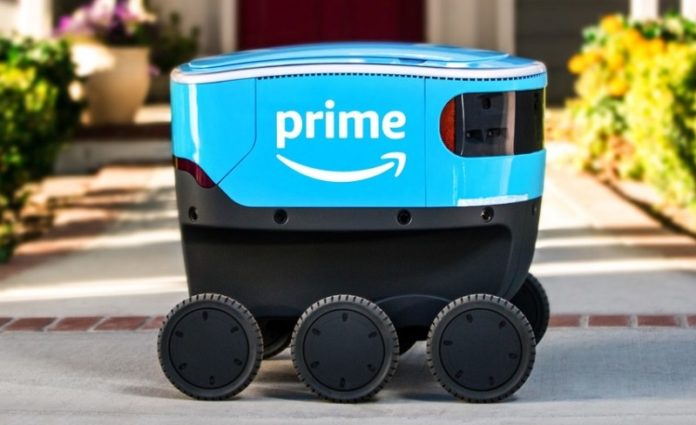A bill authorizing Amazon to operate automated delivery vehicles on city sidewalks gained new life Thursday after it won approval in a Senate committee.
The Senate Commerce Committee signed off on legislation allowing Amazon to deploy its automated vehicle – known as Scout – over fears that it would cost delivery service workers jobs.
The bill appeared in jeopardy after FedEx asked for a bill that would have allowed a much larger vehicle – known as Roxo – to run on city sidewalks and crosswalks.
The committee went with a bill that limited the size of automated vehicles to 150 pounds and run no faster than 6 mph.
Amazon’s Scout weighs about 100 pounds and is under 3 feet tall.
FedEx’s Roxo weighs 450 pounds and is a little more than 4 feet tall.
FedEx wanted permssion to operate vehicles weighing 550-pound vehicles and running at up to 10 mph on sidewalks.
Cities said FedEx’s request was too much and would put pedestrians at risk if they were hit by a vehicle that large.
The bill limits the delivery robots to operating on city sidewalks and crosswalks. Amazon must still get approval from local governments to operate the vehicles.
The vehicles must not block public rights-of-way and obey all traffic and pedestrian control signals and devices.
The personal delivery “device” would be exempt from motor vehicle registration requirements and would not be considered a “vehicle” under Kansas law.
Amazon would have to maintain insurance coverage of at least $1 million for any damages that would stem from operating the vehicles.
Democratic state Sen. Tom Holland objected to the bill, fearing it would cost other delivery service workers their jobs.
“The thing that really bothers me with this bill is that this is disruptor technology,” Holland told the committee.
“Make no mistake. More jobs will be lost that would employ Kansans as this technology gets adopted,” Holland said. “It will spread like wildfire. This is just the start.”
Holland said technology evolution can be good for consumers, but said these vehicles are being treated different from other vehicles that are taxed.
“My real problem with this bill is that it creates an uneven playing field,” he said.
“It’s allowing Amazon and other firms that want to get into this, basically not have to acknowledge that these are, in fact, vehicles,” he said.
He said the bill will means that local governments will essentially subsidize Amazon for vehicles that are putting wear and tear on their sidewalks.
Amazon has already deployed the vehicles in four markets: Irvine, California; suburban Seattle; Atlanta; and Franklin, Tennessee, just outside of Nashville.
Amazon said that 12 states and Washington, D.C., have passed laws allowing automated delivery vehicles.
The company has been looking for “innovation-friendly neighborhoods” elsewhere to deploy what it considers another option for last-mile deliveries.
“We are starting in suburban areas but hope to expand to additional communities in the
future,” said Jeff Cleland, state and local transportation policy lead for Amazon.
“Suburban sidewalks are some of the least utilized infrastructure in certain regions,
and this is a safe, innovative and environmentally friendly last-mile delivery option,” Cleland told the committee recently.
More wonkishly known as a “personal delivery device,” Amazon’s Scout is the size of an ice cooler and travels at about 3 mph – a walker’s pace.
An Amazon van drops off the delivery robots in the neighborhood where deliveries are scheduled.
The electrically powered vehicles primarily run on neighborhood sidewalks, although they can reroute onto the road if they encounter obstacles.
While the vehicle is equipped with sensors so it can dodge sidewalk hurdles, Amazon officials have conceded the delivery robot is not suited for every neighborhood, especially those without sidewalks.















